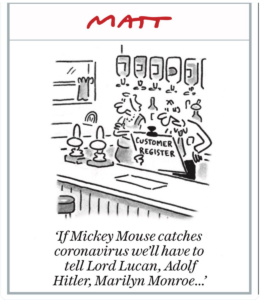Quote of the Day
It’s not just that the United States has the highest number of coronavirus cases and deaths of any country in the world. Republican political dysfunction has made a coherent campaign to fight the pandemic impossible.
At the federal level as well as in many states, we’re seeing a combination of the blustering contempt for science that marks the conservative approach to climate change and the high tolerance for carnage that makes American gun culture unique.
Opening up?
The incomparable Matt in the Daily Telegraph. It seems that the rules that will supposedly allow pubs to open on July 4 may require publicans to record the identities of their patrons.
Go download, Moses
My friend (and fellow gadget-warrior) Quentin received a nice gift from his in-laws.
Something I hadn’t thought of…
… when I was writing last Sunday’s Observer column about Nick Clegg and his role in Facebook.
From Charles Arthur in The Overspill.
And the irony is that his head of PR is Nick Clegg, who was undone in 2015 by microtargeted adverts in the southwest of England run by the Conservative Party against the Lib Dems, which Clegg had led in coalition for the previous five years with the Conservatives. Facebook’s PR guy who stands up for its political advertising lost his last job because he was screwed over by Facebook’s political advertising.
After Zoom, what?
Typically insightful blog post by Benedict Evans.
Now, suddenly, we’re all locked down, and we’re all on video calls all the time, doing team stand-ups, play dates and family birthday parties, and suddenly Zoom is a big deal. At some point many of those meetings will turn back into coffees, we hope, but video will remain.
Will it still be Zoom, though?
As a breakthrough product, I think it’s useful to compare Zoom with two previous products – Dropbox and Skype.
Part of the founding legend of Dropbox is that Drew Houston told people what he wanted to do, and everyone said ‘there are hundreds of these already’ and he replied ‘yes, but which one do you use?’ That’s what Zoom did – video calls are nothing new, but Zoom solved a lot of the small pieces of friction that made it fiddly to get into a call.
His other point of comparison is Skype. Just as for video, VOIP had been around for a long time, but Skype made using it less geeky and more frictionless in both engineering and user experience, and by doing so made VOIP a consumer product.
But…
Two things happened to Skype after that, though. The first is that the product drifted for a long time, and the quality of the user experience declined. But the second is that everything has voice now. Imagine trying to do a market map today of which apps on a smartphone, Mac or PC might have voice – it would be absurd. Everything can have voice.
Evans thinks that this is what will happen to video conferencing.
There will continue to be hard engineering, but video itself will be a commodity and the question will be how you wrap it. There will be video in everything, just as there is voice in everything, and there will be a great deal of proliferation into industry verticals on one hand and into unbundling pieces of the tech stack on the other. On one hand video in healthcare, education or insurance is about the workflow, the data model and the route to market, and lots more interesting companies will be created, and on the other hand Slack is deploying video on top of Amazon’s building blocks, and lots of interesting companies will be created here as well. There’s lots of bundling and unbundling coming, as always. Everything will be ‘video’ and then it will disappear inside.
Zoom was a shrewd investment for the present time. Whether it is longer-term depends on the agility and imaginativeness of its founders.
Quarantine diary — Day 94
This blog is also available as a daily email. If you think this might suit you better, why not subscribe? One email a day, delivered to your inbox at 7am UK time. It’s free, and there’s a one-click unsubscribe if your decide that your inbox is full enough already!

